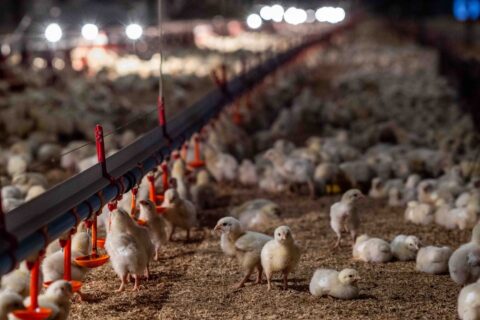News
People Can Give Cows Tuberculosis, But We Rarely Look For It
Health•5 min read
Perspective
Industrial animal agriculture is exacerbating the risks of zoonotic diseases. Are elected officials ready to dismantle the system that got us into this mess?


Words by Aysha Akhtar
To prevent the coronavirus’ spread, we’ve been told to create distance, avoid others who are sick, lower stress, and to exercise—but our treatment of farmed animals who are also susceptible to coronaviruses is exactly the opposite.
Industrialized meat production is among the most dangerous enablers of zoonotic infectious diseases. The sheer number of animals kept confined on factory farms, the logistics of managing their waste on an enormous scale, breeding practices that fail to prioritize genetic diversity, transportation methods that maximize animal stress, and hazardous conditions endured by workers all contribute to a powder keg of health, safety, and ecological perils. Our current system is harming people, animals, and the Earth, and COVID-19 should be our wake-up call.
Our industrialized agriculture food system puts both workers and animals at risk. Keeping animals confined in tight spaces out of their natural habitat increases the spread of diseases among them and the risk to humans. A variety of animals can act as hosts for viruses like SARS-CoV-2 and Influenza A. Animals on factory farms, in particular, serve as reservoirs for viruses—for example, pigs and chickens carry different types of influenza, which are continuously mixing and mutating. Just think, for every human on this planet, there are about 10 land animals raised and killed for food at any one time. Why are public health officials not addressing the intensive confinement of animals? Studies have shown again and again that the confinement of animals for food is directly responsible for the explosion of deadly new strains of bird and swine flus. One notable bird flu, H5N1, has a mortality rate of 60 percent. Can you imagine a pandemic in which three out of five people who contract the virus die?
To make matters worse, antibiotic overuse in animal agriculture is a ticking time bomb that can compound the problems we face with viral pandemics. All too often, viral infections lead to superimposed bacterial infections. Without an arsenal of antibiotics that work due to the rising antibiotic resistance from overuse, death rates could significantly increase.
Just recently there have been reports that a mink may have transferred the coronavirus to a worker at a fur farm in the Netherlands. While there have been multiple big cats and domestic cats and dogs to get the coronavirus, this is the first case tracing the virus being passed on to humans by an animal, although the details remain unconfirmed. While more research is needed to find out which animals can pass SARS-CoV-2 to humans, we already know that our close interactions with animals living in confinement are exacerbating the risks of zoonotic diseases.
If Big Ag keeps the status quo, we will potentially face even more dire diseases down the road.
Our government has tilted the scale in favor of large agribusiness interests, subsidizing them instead of more responsible producers, helping to keep consumer prices artificially low compared to more healthful foods. But now lawmakers have an opportunity to make changes to prepare our food system for the future by prioritizing innovations in meat production—such as meat derived from culturing living cells—and plant-based foods. Our leaders have long acted to prop up industrial animal agriculture through subsidies and exemptions from environmental, animal welfare, and worker-safety rules and enforcement. It’s time now for our government to prioritize a sustainable future.
Our laws and public health and regulatory agencies have failed us. The U.S. has known a pandemic was coming, but instead of working towards prevention, we built and financed the infrastructure to foster and breed zoonotic disease, with only a system to react after the death and destruction were already upon us. A recent report published by the Animal Legal Defense Fund, details not only our country’s missteps but also the immediate actions necessary from our leaders to mitigate COVID-19’s impact and prevent the next pandemic.
As the world reels—with more COVID-19 deaths in the U.S. than any other nation—our government can and should step up to meet the moment. Are our elected representatives ready to facilitate change by dismantling the industrial animal agriculture system, discontinuing subsidies and guarantees for an industry that cannot survive without our tax dollars, and instead offering financial incentives to farmers to encourage them to switch to new crops and new technologies? Our leaders have helped Big Ag at the expense of the greater good for too long. In this critical moment, it’s their duty to protect our health and safety instead.